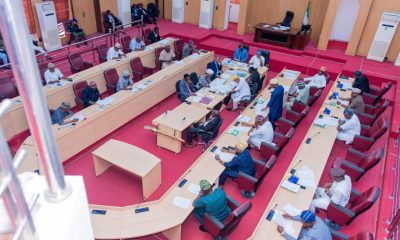News
Recession: Chinese Economy and Nigeria Today By Ismail Afolabi

With the current financial privation in Nigeria, millions of Nigerians have been reduced to nothing while few still remained undaunted with strong believe that, sometimes, good things may have to fall apart for better things to fall in place. One of those with the optimal mindset is Comrade Arisilejoye Azeez, the convener and admin of a whatsapp group christened “Strictly Politics”.
As political spat unfolds on the said social media platform today with stiff ‘blame-storming’ and brainstorming, he reeled out an extract from a book titled: “Chinese International Economic” to support his claim and argument in support of President Muhammadu Buhari led-administration. Here, I present to you, in summation, the thrust of the text written in 1989 and revised in 2006 adopting it to Nigeria present state.
To the point and without stating the ‘obvious’, accordingly, China used to follow a policy of trade autarky through the 1970s. In part, the policy of trade autarky was necessitated by her economic considerations and political events: the Korean War, the Vietnam War, and the break with the Soviet Union. The policy was also the result of ideological considerations, with Maoists believing that foreign trade could lead to a return to a capitalist mentality and to dependence on the capitalist countries. In view of this, Chinese pricing system significantly undervalued agricultural products and overvalued industrial products.
But, with the reformation and regeneration of China economic policies in late 1970s, there was a considerable enlargement of trade. “China entered the global economy and has become a major part of global production networks today. In September, 1971, China joined the United Nations. In 1972 and 1973, obstacles to trade with Japan were removed and relations were opened with the United States. By the end of the 1970s, the United States already had become China’s third largest trade partner, after Japan and Hong Kong. From 1972 to 1974, China imported mainly agricultural products from the United States, especially grains. Then, in 1975, China virtually cut off all imports of grain, causing a major drop in American exports to China. China took this action in part because of an improvement in the domestic grain supply.
Like Nigeria of today, the “changes” from the economic policies generated problems for China in the 1980s and early 1990s. “The expansion of investment spending generated trade deficits. China’s trade and current account balances went into deficit as early as 1982. These deficits were financed by reducing China’s international reserves and by borrowing from abroad and as of 1986, China had a foreign debt of $28 billion. The trade deficits created a serious constraint on China economic growth. Faced with the deficits, the central government began an economic retrenchment (that is, reduced spending). Part of this retrenchment was designed to make it harder to import.”
In that stormy state of destitution and instability, beginning in the mid-1990s, China began to move in the direction of a fully open economy. “In 1994, access to foreign exchange was made much more widely available. Any importer of goods or services could now purchase foreign exchange directly. This was a major step in the direction of creating a free market in foreign exchange. More so, the Chinese government decided to have a fixed exchange rate against the U.S. dollar. China set the exchange rate at 8.28 yuan to one American dollar.”
I am particularly amazed to realize that the undervalued exchange rate increases China’s exports (because the Chinese products are artificially cheap for foreigners) and decreases China’s imports (because foreign products are artificially expensive for the Chinese). Certainly, the consequential effects of China short term pains are known to all of us now – long term gains! As of today, China has moved from being a closed economy to being an open economy. In fact, the American trade deficit with China which was small until the middle 1990s has grown as Chinese economy is becoming more and more open.
To this end, one would expect this trend to come to fore in Nigeria given our enormous resources and comparative advantage in global economy. It is apparent from the description of the text in view that Buhari has no choice but to “change” Nigeria development strategies completely. And, to achieve the end results, though unfortunate, the current anguish is necessary as there cannot be success without struggle and sacrifice. The take home here is that like China, Nigeria must desert its relative policy of trade autarky – importing this and that and narrow-mindedness – and embrace openness to the world economy. While president Buhari needs to be very careful not to compound the problems and curb importation as the domestic supply of Nigerians needs improves, we Nigerians all have to take charge and stop the blame game. Look inward for our developments and promotes our domestic products in the interest of all of us and the coming generations.
Written by Afolabi Ismail (Marble), founder, Noble services – an academic research firm.
-

 Entertainment5 days ago
Entertainment5 days agoNigerian Singer, Ifunanaya, Died After Snake Bite In Abuja
-

 News4 days ago
News4 days ago20-Year-Old College Student Found Dead With Body Parts Missing In Kogi
-

 News5 days ago
News5 days agoOsun Assembly Warns UBA, Oyetola, APC Over Alleged Diversion Of Osun LG Funds
-

 News4 days ago
News4 days agoOver 100 Deaths Averted As Soldiers Evacuate Suspected Bomb From Church Premises In Abia



